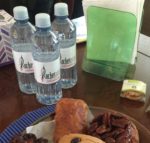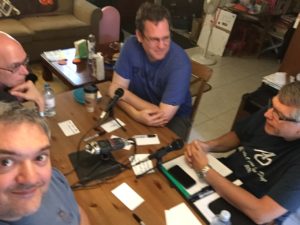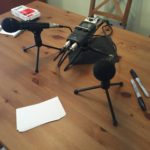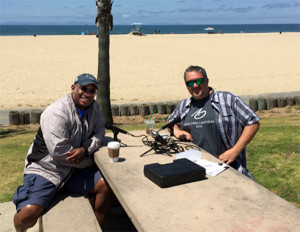Recently I was asked about using Lean Coffee (LC) in the workplace, something I’ve been doing for the past few years. While I’m a strong advocate for LC’s workplace applications, I’d like to start with my view of the broader picture. (I’ve written about my experiences with LC before, but this post has more experiences to back it up.)
I’d originally heard about Lean Coffee three years ago when I met Jim Benson at SFAgile2012. I immediately fell in love with the framework, so much so that I switched my twitter handle to @AgileCoffee. Once I returned from the conference, I started a bi-weekly Lean Coffee here in Orange County, CA, that still meets regularly. (By the way, I’ve got nothing but love for Jim & Jeremy and the leancoffee.org website. I credit them often and drive traffic to their site, all so I can help shout about LC from the rooftops. So many potential applications, IMO.)
For the community LCs that I run (and I’m all about community), I use meetup.com to get the word out and organize. It costs a bit of money out of my own pocket, but the payback has been amazing. We’ve had an Agile/XP community here for many years – mostly project managers and technologists showing up to monthly workshops out of habit to eat pizza – by and large, those events (while useful) aren’t very exciting. The LCs, on the other hand, draw a subset of non-zombiefied practitioners as well as students and entrepreneurs who find us via meetup. I’ve been holding these for nearly three years now, but rarely have co-workers come by to participate.
A recent spin-off of the community meetups is the podcast. Some of the regular visitors to the meetups agreed that the conversations were often too valuable/entertaining to let fade away, so we began holding separate sessions to be recorded (and published to Stitcher and iTunes). It was an easy transition, and we follow the LC format in real time on each episode. (In the earliest episodes I explained the rules, not so much these days.) These have allowed us to share the conversations around the globe. As of this writing, we have about 240 downloads per session with a few questions & comments coming from these. 18 episodes produced so far, three more in the pipeline, and our next recording meetup in a week. All recording sessions for the podcast are held in person – I’m resisting the temptation to do a LC by Skype or Google hangout, mostly because I believe face-to-face is the only way to do a LC.
When I go to conferences and Open Space events, I carry a kit filled with index cards, sharpies and some blue tape. Impromptu LCs can spin up in no time at all. (An interesting aside: I’ve kept nearly all the (anonymous) index cards from my meetups, podcast sessions and impromptu LCs for a few years now. Someday I hope to index, group and share them. Not sure how or why, but I enjoy seeing questions repeated or themes forming over time.)
I also get invited to speak locally/regionally about LC and the benefits for using them in the workplace. For each presentation, I use a slide deck I created so I can put LCs into context before holding mini-coffees with large groups. (This year, I created a pecha-kucha for the Scrum Alliance gathering in Phoenix … crossing my fingers to get accepted.) We also were talking a year ago about trying a Scaled Agile Coffee TM (aka really big LC), but realized that Agile Opens and Agile Coach Camps are pretty much what we had in mind. (We’re hosting the next ACCUS here in Irvine in a couple months.)
Okay, so with regard to the workplace…
It didn’t take too long after starting the community LCs before I wanted to experiment with them at work. Back then I was a coach/SM at SendGrid, and I was always looking for alternative experiences for the retrospectives. The first time I ran a LC, the quick reaction was “WTF?” The team was used to me trying different techniques, but this one caught them off guard somehow. By the time the session timebox expired, they (almost) didn’t want to leave the room. We’d discovered together how some topics – previously given lip-service at prior retros – were actually important and complex enough that they dominated a 90-minute session. More cards were created mid-coffee, and we were surprised that even the normally quiet and reserved members became vocal. (I think it was as much about getting them out of their comfort zone as much as it was about the LC format itself, but… winning!)
A year ago I attended a workshop on retrospectives led by Diana Larsen. I’d brought up LCs as an alternative technique, and the room exploded. Other folks there had previously employed it, to equally dramatic results. I’ve found, though, that I can’t use it on a regular cadence with my teams. I like to spring it on teams when they least expect it, otherwise it could turn into one large bitch session.
It’s a great format for brainstorming activities, as you likely know. Not so good for ordering / prioritizing work or detailing technical concepts, though.
I’ve used LC with my Scrummasters. SendGrid had 10-12 teams spread across four locations when I left, with about five full-time SMs who self-organized to share “best practices” (I use the term loosely). When we were able to be together in person, I would carve out time for a SM-focussed LC so we could address common concerns and brainstorm new activities. We’d even tried to hold a SoS as a LC, but it wasn’t too successful. Oh well, we tried.
Now I’m at another workplace, and I use LC more than ever. I still keep it as a retro technique, but I’ve also introduced it to managers and executives. When my boss asked me to organize the ritual yearly Roadmap exercise, I shocked the system by holding a LC in the boardroom. Defenses came down when we affinity mapped the cards into topics and found overwhelming support for issues related to tech debt, stability and scaling our services. Suddenly pie-in-the-sky features didn’t seem nearly as urgent to the C-levels present. Although later meetings were more traditional, the LC exercise cut right to the meat of what would become our highest priority objectives for the year. Saved time with a lot less arguing and horse-trading than I’d experienced with similar roadmapping cycles at previous organizations.
Over the holidays, a peer/mentor of mine pushed me to try to find more applications of this lightweight, agenda-less model in the workplace. It really is my laboratory, and LC is a fantastically easy and effective format to throw at unsuspecting participants.
I’d like to discover more uses of Lean Coffee. If you have other applications, please share in the comments below or to me via twitter @AgileCoffee.
– – – –
Update 2/25/15: I wrote a guest post on the Modus Cooperandi blog entitled Fresh Perspectives on Lean Coffee where I go into a bit more detail on the roadmapping exercise. I’ve also dedicated an entire post on Roadmapping with lean coffee and Edward De Bono’s Six Thinking Hats. Enjoy!



